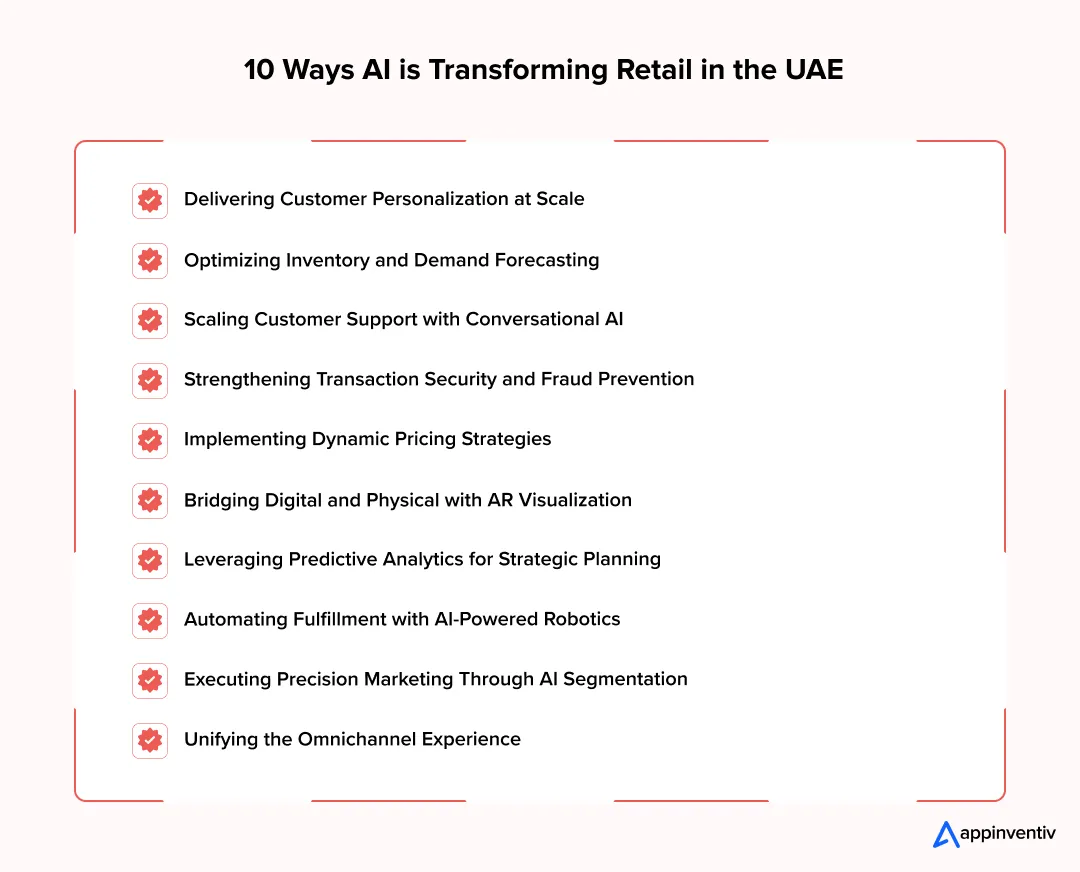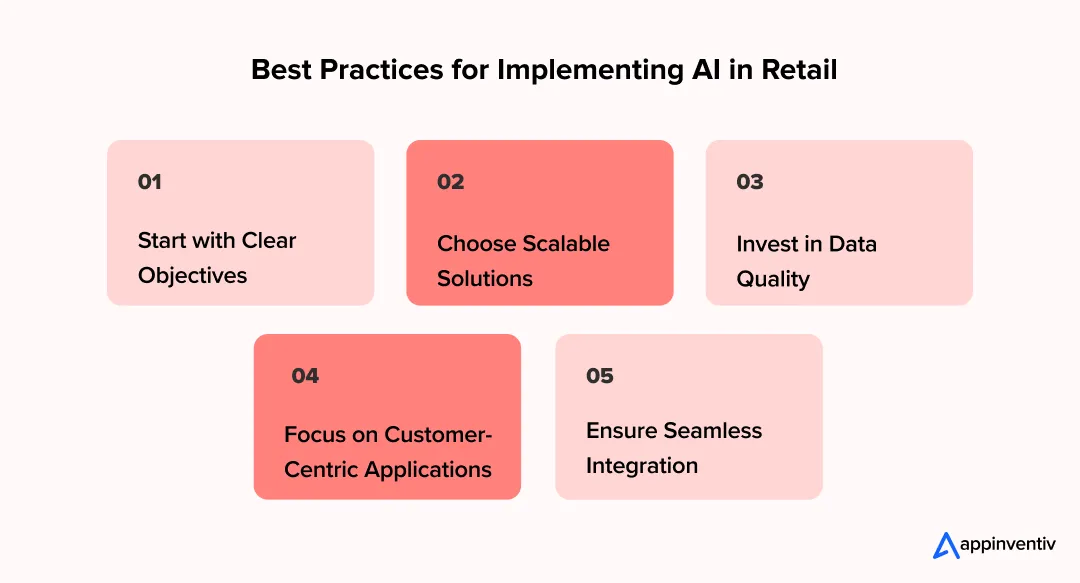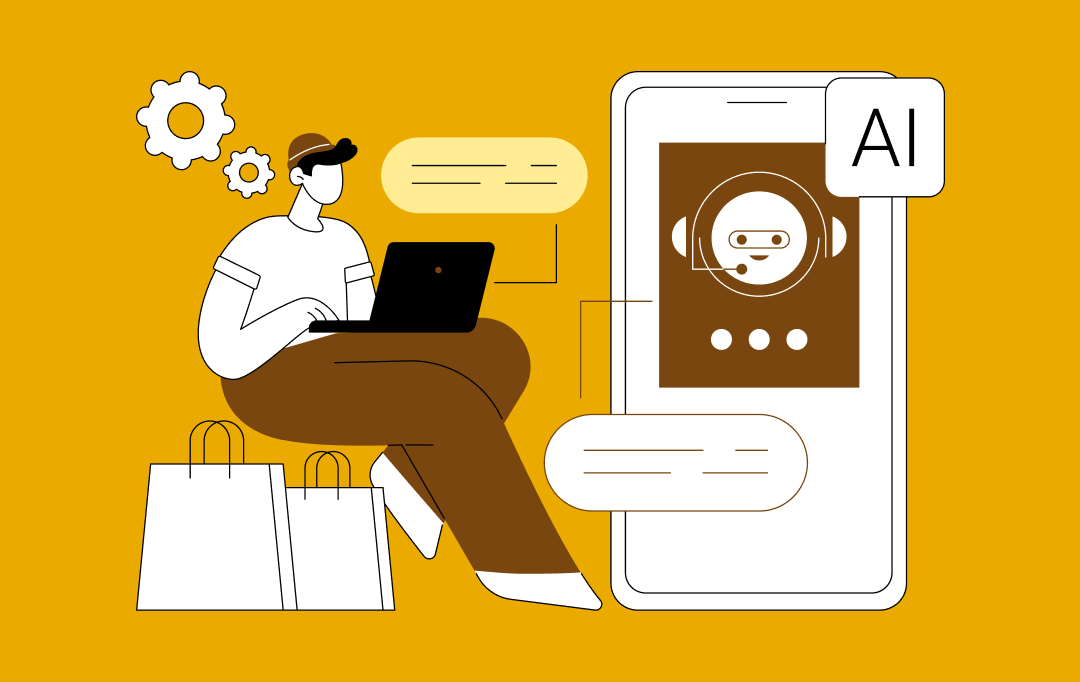- The Role of AI in Retail in the UAE: Market Insights
- 10+ Ways AI is Transforming Retail in the UAE
- 1. Delivering Customer Personalization at Scale
- 2. Optimizing Inventory and Demand Forecasting
- 3. Scaling Customer Support with Conversational AI
- 4. Strengthening Transaction Security and Fraud Prevention
- 5. Implementing Dynamic Pricing Strategies
- 6. Bridging Digital and Physical with AR Visualization
- 7. Leveraging Predictive Analytics for Strategic Planning
- 8. Automating Fulfillment with AI-Powered Robotics
- 9. Executing Precision Marketing Through AI Segmentation
- 10. Unifying the Omnichannel Experience
- 11. Enhancing Visual Search and Recommendation Systems
- 12. Optimizing Delivery and Last-Mile Logistics
- Real-World Case Studies: AI Success Stories in UAE Retail
- Majid Al Futtaim: Customer Experiences at Carrefour
- IKEA UAE: Empowering Customers with AR and AI
- Noon.com: AI for Security and Enhanced Shopping
- L’Oreal Middle East: AI for Beauty Innovation
- Emaar’s The Dubai Mall: AI in Customer Engagement
- Chalhoub Group: AI in Luxury Retail
- Key Benefits of AI in Middle East Retail Businesses
- Enhanced Customer Experience
- Operational Efficiency
- Improved Decision-Making
- Fraud Prevention
- Sustainability
- Overcoming Challenges in AI Adoption for UAE Retailers
- 1. Data Privacy and Security
- 2. Integration with Legacy Systems
- 3. Cost of Implementation
- Best Practices for Implementing AI in Retail
- Start with Clear Objectives
- Choose Scalable Solutions
- Invest in Data Quality
- Focus on Customer-Centric Applications
- Ensure Seamless Integration
- The Future of AI-Powered Retail Experiences in the UAE
- AI-Enhanced Personalization
- Autonomous Shopping
- AI-Driven Virtual Assistants
- AI and IoT Integration
- How Appinventiv Enables AI-Powered Retail Transformation in the ME Region
- FAQs
- Q. How can AI improve customer experience in Middle Eastern retail stores?
- Q. How is AI helping retail chains in the Middle East optimize inventory management?
- Q. How long does AI implementation take for Middle Eastern retail businesses?
- Q. How can AI improve personalization and customer engagement in Middle Eastern retail?
- Q. How can AI-driven chatbots enhance customer support in Middle Eastern retail?
Key takeaways:
- AI-Powered Personalization: With consumers expecting tailored shopping experiences, AI in retail allows businesses to deliver personalized recommendations and dynamic experiences, improving customer engagement and loyalty.
- AI Enhances Operational Efficiency: AI automation in retail streamlines inventory management, demand forecasting, and logistics coordination, reducing stockouts and excess inventory while improving overall efficiency.
- AI-Driven Decision Making Optimizes Retail Strategy: By analyzing large datasets, AI enables retailers to make informed decisions on pricing, inventory, and marketing, ensuring competitiveness in the dynamic UAE market.
- AI Implementation Drives Long-Term Business Benefits: From fraud detection to sustainability, AI helps Middle East retailers reduce costs, improve security, and align with consumer demands, boosting profitability and trust.
The UAE’s retail sector is changing faster than most people realize. Digital adoption, rising consumer expectations, and demand for better shopping experiences are driving this shift. According to Grand View Research, the UAE’s AI in retail market is projected to surge to USD 1.3 billion by 2030, growing at an impressive CAGR of 26.3%. This growth highlights the increasing reliance on technology in retail operations.
What makes the UAE different is its luxury retail culture. Shoppers expect sophisticated experiences, whether they’re in Dubai Mall or buying online. Traditional retail operations can’t deliver this anymore. You need intelligent systems that actually anticipate customer needs and personalize interactions.
That’s where AI in retail creates real value. Not the buzzword version- practical applications that improve operations, manage inventory smarter, predict what customers will want, and enhance engagement.
Retailers that effectively use AI automation can anticipate customer behavior, streamline operations that once required constant manual work, and offer personalized experiences at scale. In the UAE market, that’s not optional. This guide covers specific ways in which AI in retail in the UAE is shaping.
Tap into the UAE’s booming retail market with Appinventiv’s AI-driven retail solutions.
The Role of AI in Retail in the UAE: Market Insights
AI is changing UAE retail in ways that show up in quarterly results. Over 71% of UAE retailers have identified AI in retail as a top investment priority for 2025, with a focus on sales and marketing, security and fraud prevention, and product development. They’re using AI because it works for personalization, inventory management, forecasting, and marketing execution.
The UAE-specific Artificial Intelligence in Retail market is estimated at USD 338 million in 2024 and forecast to reach USD 1.307 billion by 2030, as per Grand View Research. A significant portion of that growth comes from retailers who’ve figured out how to use Artificial intelligence in retail to deliver what UAE consumers actually want: convenience that doesn’t feel like a compromise, luxury experiences that match expectations, and transactions that just work.
As the market expands, AI in MENA retail continues to redefine how customers interact with brands. Artificial intelligence retail solutions in MENA are driving major AI trends in retail, from AI-powered customer experiences to smarter supply chain management.
Similar transformations are reshaping AI in retail across Saudi Arabia, Qatar, Kuwait, Bahrain, and Oman, where forward-thinking retailers are adopting intelligent technologies to enhance customer engagement, optimize operations, and sustain competitiveness in the evolving MENA retail landscape.
Where it’s making a real impact:
- Personalized experiences. Recommendation engines that generate relevant suggestions based on preferences, rather than random products. AI Chatbots that solve problems instead of creating frustration. Virtual shopping assistants that understand context.
- Operational improvements. Predictive AI inventory systems that prevent both stockouts and overstock situations. Demand forecasting is accurate enough to support purchasing decisions.
- Marketing that converts. Real-time consumer insights replacing demographic guesswork. Campaigns targeted based on actual behavior patterns, not assumptions about what “luxury shoppers” want.
- Fraud detection. AI monitoring transaction patterns and flagging anomalies fast enough to prevent losses rather than just documenting them afterward.
Retailers gaining an edge in the UAE market aren’t just reducing costs through emerging AI trends; they’re creating customer experiences that competitors struggle to replicate. That capability gap is what’s separating winners from those falling behind right now.
10+ Ways AI is Transforming Retail in the UAE
The UAE retail scene has changed more in the past three years than in the previous decade. Spend an afternoon at City Walk or Mall of the Emirates, and you’ll see it: customers aren’t just browsing anymore. They’re expecting experiences that feel built specifically for them.
That’s created a real challenge for retailers. Operations keep getting more complicated, while customer expectations keep rising. AI in retail has shifted from being a competitive edge to something you need just to keep up. Here’s what’s actually working on the ground.

1. Delivering Customer Personalization at Scale
AI for retail in the Middle East has helped personalize the shopping journey. Customers now expect recommendations that make sense, and an AI-powered customer experience in retail can deliver this. By analyzing customers’ browsing patterns, shopping history, and preferences, AI creates experiences that feel individualized.
Good AI understands user behavior, analyzing browsing patterns and past purchases to suggest products that truly match their preferences. When it works properly, customers find things faster and keep coming back. The tough part? Doing this for thousands of people at once without it feeling generic or robotic.
2. Optimizing Inventory and Demand Forecasting
Talk to retail managers about what stresses them out most, and inventory will come up fast. Stock too much and you’re tying up cash you need elsewhere. Stock too little and you’re watching customers walk out because shelves are empty.
AI forecasting analyzes weather patterns, local conditions, buying trends, and other variables to predict what you’ll need and when. For chains running multiple stores, it determines which locations need what in real time. Nobody’s claiming this is perfect- but it’s dramatically better than guessing based on last year’s numbers.
AI-driven analytics is transforming how retailers manage stock and demand. In the Middle East, the use of AI in MENA retail has enabled more accurate predictions, boosting operational efficiency.
3. Scaling Customer Support with Conversational AI
Modern Conversational AI and chatbots understand how people really talk, remember what you said earlier in the conversation, and solve problems effectively. They handle the routine stuff 24/7, so your human team can focus on situations that genuinely need empathy and judgment. Result? Customers get answers faster. Your staff burns out less. Both of those matter.
4. Strengthening Transaction Security and Fraud Prevention
Fraud has become increasingly sophisticated, and traditional rule-based security systems can no longer keep pace. These systems are often criticized for mistakenly blocking legitimate transactions.
AI analyzes hundreds of data points every time a purchase is made from, device behavior and navigation flow to past transactions, to instantly flag suspicious activity. It continuously learns and adapts, becoming more precise at distinguishing genuine customers from potential fraudsters, safeguarding your revenue without disrupting real buyers..
The AI impact on Middle East retail has been substantial, with AI automation reducing the burden of traditional fraud detection and creating a more secure and reliable environment for transactions.
5. Implementing Dynamic Pricing Strategies
Markets move incredibly fast now. Competitors adjust prices several times a day. Customer demand shifts based on factors you probably can’t track manually, even if you tried.
AI pricing looks at your inventory levels, what competitors are charging, and how sensitive your customers are to price changes, then adjusts within boundaries you set. When you’re managing thousands of products, there’s really no other practical way to stay competitive while protecting margins. AI helps retailers implement emerging new AI trends in retail by analyzing competitive pricing, customer demand, and product availability.
6. Bridging Digital and Physical with AR Visualization
Buying furniture online used to feel like a gamble. Same with clothes, cosmetics, and anything where fit or appearance really matters. With AI integration challenges in retail largely solved, retailers in the UAE have embraced AR.
AR technology lets people see products in their actual environment using their phone camera. That sofa is sitting in your living room. That dress on someone with your body type. Several retailers have told me that when customers can visualize products in context before buying, they purchase more confidently and return things way less often.
7. Leveraging Predictive Analytics for Strategic Planning
Retailers generate absolutely massive amounts of data every single day. The competitive advantage goes to whoever figures out what it means before everyone else does.
AI-driven predictive analytics spot trends early —such as which products will take off next month, which marketing messages will resonate with which customer groups, and where demand is headed. You’re not just reacting to yesterday’s sales numbers. You’re preparing for what’s likely to come next week and next month.
8. Automating Fulfillment with AI-Powered Robotics
Traditional warehouses depend heavily on people walking several miles daily just to pick orders. It’s slow, it’s expensive, and mistakes multiply when things get busy.
AI automation in retail has advanced with the integration of AI-powered robotics, revolutionizing warehouse operations. They transport products to packing stations. They coordinate to optimize routes. They scale up during peak periods without you having to hire temporary workers desperately. Customers receive orders faster with fewer errors-and that’s what builds loyalty over time.
9. Executing Precision Marketing Through AI Segmentation
Generic email campaigns get ignored. Everybody knows this. Yet somehow, many retailers keep sending them anyway.
AI-driven retail analytics enables the creation of precise customer micro-segments based on real behavioral data. Who responds to discount codes? Who cares about new product launches? When is each person most likely to actually open an email? Personalized outreach at this level simply wasn’t possible when everything was manual, but it drives substantially better results than blasting everyone with the same message.
10. Unifying the Omnichannel Experience
Customers really don’t care how your company is organized internally. They want to check inventory on their phone, buy something in your store, then return it via your app- whatever’s most convenient that particular day.
AI for retail in GCC keeps inventory visibility, pricing, and customer information consistent across every single touchpoint. Someone can browse products on mobile during their lunch break, verify the nearest store has it in stock, then swing by to pick it up after work. These seamless experiences aren’t special features anymore- they’re what people expect as standard. This AI-powered customer experience in retail is now a must-have for competitive retailers.
11. Enhancing Visual Search and Recommendation Systems
Visual search lets customers upload photos of products and get recommendations for similar items you stock. Someone spots a dress they like on Instagram, screenshots it, uploads it to their app, and finds matching options right away.
This helps people find what they want faster. They buy instead of getting frustrated and leaving your site for a competitor who makes product discovery easier.
12. Optimizing Delivery and Last-Mile Logistics
Last-mile delivery determines whether customers stay loyal or switch to competitors in UAE retail. AI optimizes routes around traffic in Dubai, predicts delivery times people can actually count on, and manages fleets more efficiently across the city.
Faster, more reliable delivery results. UAE customers expect same-day or next-day delivery now, it’s standard, not premium service. Delivering on time keeps customers loyal; failing to do so sends them straight to competitors who offer faster, more reliable service.
Learn how Appinventiv’s data-driven platform empowered Americana’s 2,100+ restaurants across 12 countries to streamline operations and enhance customer satisfaction.
Real-World Case Studies: AI Success Stories in UAE Retail
AI transitioned from experimental to operational in UAE retail approximately two years ago. What follows are observations from tracking major retailer implementations.
Majid Al Futtaim: Customer Experiences at Carrefour
Carrefour’s mobile application is a great example of AI integration challenges in retail, as it displays different promotions to different customers shopping at the same store simultaneously. The system tracks purchasing patterns, browsing behavior, and product interactions to deliver targeted offers.
One customer receives discounts on organic produce, another sees promotions on household goods- both are shopping at the same Carrefour location but receiving personalized experiences based on their individual purchase histories. By using AI for personalized shopping in GCC, the app adjusts promotions based on customer data, enhancing customer loyalty.
The business rationale is straightforward: generic promotions generate poor response rates. Targeted offers matching demonstrated customer preferences drive higher engagement and increased transaction frequency. Conversion rates improve when promotions align with actual customer needs rather than broad demographic assumptions.
IKEA UAE: Empowering Customers with AR and AI
Furniture purchases carry inherent risk- customers can’t physically assess fit and scale until delivery. This uncertainty drives high return rates, creating significant costs for retailers.
IKEA’s augmented reality, AI in retail, combined with AR for a unique shopping experience. Customers use phone cameras to place virtual furniture in actual living spaces before purchase. The visualization shows accurate scale and placement, reducing pre-purchase anxiety.
For IKEA, this technology directly impacts return rates- a major cost factor in furniture retail. When customers can visualize products in context before purchasing, return rates decrease measurably. The technology investment recovers costs through reduced reverse logistics expenses.
Noon.com: AI for Security and Enhanced Shopping
As one of the leading eCommerce platforms in the UAE, Noon.com is setting a high standard for security and customer engagement. Noon leverages AI in retail pharmacy and AI-powered customer experience in retail fraud detection. This technology ensures that shoppers feel confident making purchases, knowing that their sensitive information is protected. In addition to security, Noon uses AI-powered chatbots to guide customers through their shopping journey, answering questions, suggesting products, and providing instant support, all while enhancing the overall shopping experience.
For Noon, AI is not just about reducing fraud; it’s about creating a secure, seamless environment for customers, which leads to greater trust, satisfaction, and, ultimately, conversions. In today’s digital world, consumers won’t engage unless they feel safe and valued.
L’Oreal Middle East: AI for Beauty Innovation
Foundation shade matching presents consistent challenges- store lighting differs from home environments, making in-store selection unreliable. This drives product returns and customer dissatisfaction.
L’Oreal’s AI application analyzes skin tone through phone cameras, recommending appropriate foundation shades and personalized skincare products based on individual characteristics.
This digitizes consultations that traditionally require in-store visits with beauty advisors. In the UAE market, where consumers expect both luxury service and technological sophistication, this approach delivers both requirements simultaneously.
Emaar’s The Dubai Mall: AI in Customer Engagement
The Dubai Mall serves diverse customer segments- international tourists, local residents, and shoppers from across the Emirates. Uniform promotional approaches prove inefficient given this diversity.
Their AI system utilizes loyalty program data and mobile application activity to segment customers and deliver targeted offers. Digital signage adapts content based on foot traffic patterns and likely customer segments in specific mall areas.
During major shopping periods, promotional content varies significantly across different mall sections, clearly targeting distinct shopper segments rather than broadcasting uniform messages.
For large-format retail operating at this scale, targeted segmentation demonstrates measurable impact on both customer satisfaction metrics and revenue per visitor.
Chalhoub Group: AI in Luxury Retail
Luxury retail faces unique inventory challenges. Stockouts irreparably damage customer relationships —high-net-worth individuals expect immediate product availability. Simultaneously, overstocking luxury goods incurs substantial carrying costs due to their high product values.
Chalhoub’s AI forecasts luxury product demand with greater accuracy than traditional forecasting methods. The system manages limited inventory across multiple locations while enabling personalized VIP services by tracking individual customer preferences.
In luxury markets, exceptional personalization is a baseline expectation rather than a point of differentiation. AI enables Chalhoub to deliver this personalized experience efficiently across its retail network.
For example, Appinventiv developed an AI-powered platform for YK Almoayyed, reducing inventory costs by 32%, doubling data retrieval speed, and ensuring consistent product availability across multiple locations
Key Benefits of AI in Middle East Retail Businesses
AI automation in retail is moving fast and has shifted from experimental to essential. Here are the key benefits of AI in Middle East Retail businesses:
Enhanced Customer Experience
Personalization has become a requirement in UAE retail, not a luxury. Whether shopping at Dubai Mall or browsing, customers now expect experiences tailored specifically to their preferences.
AI-powered customer experience in retail makes this scalable by analyzing preferences and shopping patterns. When executed well, recommendations feel natural rather than forced.
Retailers getting this right see stronger engagement and repeat purchases. Some customers become advocates- valuable in a market where recommendations still carry weight.
Operational Efficiency
Managing UAE retail operations means juggling complex supply chains, multiple locations, and fluctuating demand. AI automation in retail automates the repetitive parts: inventory management, logistics coordination, and demand forecasting.
Retailers now reduce stockouts while simultaneously decreasing excess inventory after implementing AI forecasting. That’s measurable operational improvement producing cost savings and better service.
Staff time shifts from repetitive tasks to customer interactions and strategic work requiring human judgment.
Improved Decision-Making
Retail involves constant decisions- pricing, inventory allocation, and marketing spend. These used to rely on experience and historical spreadsheets.
Artificial intelligence in retail analyzes massive volumes of data, including transaction patterns, competitor pricing, customer behavior, and real-time market conditions. It forecasts trends and predicts demand.
This doesn’t replace human judgment- it provides substantially better information to base decisions on. Whether pricing during Ramadan or stocking for the Dubai Shopping Festival, the intelligence helps optimize inventory, set competitive prices, and refine marketing.
Fraud Prevention
Digital transactions carry fraud risk. Sophisticated fraud tactics evolve constantly. Traditional systems can’t keep pace.
AI-powered fraud detection monitors transactions in real time, flagging suspicious patterns such as unusual purchase velocity, mismatched addresses, and device anomalies. It learns continuously, improving its ability to separate legitimate customers from fraud attempts.
This prevents losses before they occur. For platforms processing thousands of daily transactions, this protection matters both financially and for customer trust.
Sustainability
Sustainability has shifted from a marketing priority to an operational priority. UAE consumers increasingly factor environmental impact into purchases.
AI enables accurate demand prediction and reduces waste. When you forecast requirements precisely, you produce and distribute with minimal excess. Artificial intelligence retail solutions in MENA also track supply chain carbon footprints and identify energy-reduction opportunities.
This creates a competitive advantage. Younger consumers particularly prefer brands that demonstrate genuine environmental commitment. AI makes sustainability economically viable, not just aspirational.
Learn how brands like Carrefour, IKEA, and Noon.com are revolutionizing retail with AI. Enhance engagement, optimize operations, and deliver personalized experiences.
Overcoming Challenges in AI Adoption for UAE Retailers
AI is reshaping UAE retail, but implementation brings genuine challenges. Retailers often encounter difficulties with AI integration and implementation costs, but modular solutions and cloud-based applications are delivering successful outcomes. Here’s a look at the obstacles they face and how organizations are overcoming them.
1. Data Privacy and Security
The UAE Data Protection Law introduced strict compliance requirements. Retailers must protect customer data while meeting regulatory standards. Security breaches carry both financial penalties and reputational damage, affecting customer trust.
Organizations that collect customer data through AI face greater responsibility. Customers expect careful handling of personal information and will shift to competitors who demonstrate better data protection practices.
How to overcome:
Successful retailers build privacy and security into their system architecture from the outset rather than retrofitting protection later. They engage data security specialists familiar with both technology implementation and UAE regulatory requirements. Regular staff training addresses evolving compliance standards as regulations develop.
One retail operation now conducts quarterly security audits specifically for AI systems. The investment costs less than managing breach consequences.
2. Integration with Legacy Systems
Many established retailers rely on legacy infrastructure that was not originally designed to handle the AI integration challenges in retail. These systems do not communicate well with modern tools. Data structures don’t align. APIs either don’t exist or function unreliably.
Implementation timelines extend when new AI systems must interface with existing infrastructure. Integration work that should take weeks sometimes requires months.
How to overcome:
Complete infrastructure replacement rarely succeeds. The disruption, cost, and risk prove too substantial. Retailers achieving success use modular implementation approaches.
They deploy AI for retail cloud-based applications or APIs that interface with legacy systems through middleware. One department initially. One function at a time. Validation occurs before expansion.
One fashion retailer initially implemented AI inventory forecasting across three stores. Four months of refinement preceded rollout to thirty additional locations. That phased approach prevented failures common with simultaneous large-scale changes.
3. Cost of Implementation
Smaller retailers face significant upfront costs. AI implementation in retail use cases requires investment in software licensing, infrastructure, training, integration, and consulting. These expenses accumulate quickly.
Organizations operating on constrained margins find substantial AI investment challenging to justify, despite understanding long-term benefits.
How to overcome:
Effective retailers avoid immediate enterprise-scale implementations. They begin with focused applications addressing specific operational challenges.
Inventory management problems? Start with cloud-based AI forecasting. Customer service capacity issues? Implement chatbots for routine inquiries.
Cloud-based platforms are particularly helpful because they eliminate the need for expensive hardware purchases. Subscription fees scale with usage rather than requiring large capital expenditure.
Testing, validating value, and then expanding makes initial costs justifiable to budget stakeholders.
Also Read : AI ROI insights for CXOs
Best Practices for Implementing AI in Retail
AI implementation success depends on strategic execution, not just technology selection. UAE retailers achieving results follow these principles:

Start with Clear Objectives
Define the specific problem you’re solving before evaluating solutions. Customer service response times? Inventory forecasting accuracy? Transaction values?
That clarity guided every subsequent decision, technology selection, success measurement, and implementation approach.
Vague goals like “improve operations” don’t provide sufficient direction for effective implementation.
Choose Scalable Solutions
Large-scale deployments typically fail. They cost excessively, require extended timelines, and create operational disruption.
Effective approach: start small, prove value, then expand. Modular solutions enable this graduated approach.
Invest in Data Quality
Poor data produces unreliable predictions. Organizations sometimes invest significantly in AI for personalized shopping in GCC platforms while providing inconsistent product data, incomplete customer records, and mismatched sales information across systems.
Audit data quality before implementation. Are product codes consistent? Is customer information current? Do sales records align across systems?
Retailers often spend months refining their product databases before launching a recommendation engine, but this foundational work pays off in the long run, delivering more accurate and actionable insights.
Focus on Customer-Centric Applications
Optimizing operations through AI-powered customer experiences in retail is only effective when it enhances, rather than diminishes, the customer experience.
Every AI decision should answer: Does this make shopping easier, faster, or more relevant for customers? Operational benefits should support better experiences, not undermine them.
Personalization works when recommendations reflect actual customer preferences, not just algorithmic profit maximization.
Ensure Seamless Integration
AI tools that don’t integrate with existing systems create operational complexity rather than reducing it.
For example, one retailer deployed three AI systems- inventory, customer service, and marketing that couldn’t exchange data with each other or their POS and CRM platforms. Staff entered data multiple times. Information remained inconsistent. Overall operations deteriorated despite functional AI.
Before purchasing any solution, understand integration requirements precisely. Involve IT teams early to identify problems vendors won’t mention.
Unlock the full potential of AI in retail with a strategic, customer-first approach with the help of our dedicated experts.
The Future of AI-Powered Retail Experiences in the UAE
The future of AI in retail in the UAE includes enhanced personalization, autonomous shopping, AI-driven virtual assistants, and the integration of AI with IoT for real-time inventory management. Consumers expect customized, seamless experiences, and AI in retail pharmacy is already taking steps toward this future. Here’s what’s coming:
AI-Enhanced Personalization
Personalization will get significantly more sophisticated. Beyond product recommendations, AI will adjust store layouts, promotional timing, and even pricing based on individual customer behavior patterns.
Retail executives are envisioning a game-changing system that can recognize returning customers via mobile app check-ins and instantly tailor digital signage to their purchase history. Just three years ago, this level of personalization seemed out of reach- yet today, it’s already in the testing phase.
Autonomous Shopping
Walk in, pick items, walk out, no checkout line. Amazon Go proved this concept works. Several UAE retailers are now piloting similar systems.
The technology combines computer vision, sensor fusion, and AI to track what customers take from shelves. Your account is automatically charged as you leave. For time-pressed shoppers, this eliminates the single biggest friction point in physical retail.
AI-Driven Virtual Assistants
Current chatbots handle basic queries. Next-generation virtual shopping assistants will provide genuinely helpful support throughout the entire purchase journey.
They’ll understand context from previous conversations. They’ll proactively suggest solutions based on browsing behavior. They’ll handle complex questions that currently require human agents. One luxury retailer is testing an AI assistant that can discuss fabric quality, styling options, and care instructions as competently as their trained staff.
AI and IoT Integration
Smart shelves track inventory in real-time. Sensors monitor customer movement patterns. AI systems predict demand and automatically trigger restocking. This isn’t speculative- retailers are implementing these technologies now.
The combination creates connected retail environments that respond to conditions automatically. When a product sells faster than expected, the system reorders before stockouts occur. When customer traffic shifts to different store areas, staff allocation adjusts accordingly.
Also Read: AI and IoT in business driving innovation across industries
How Appinventiv Enables AI-Powered Retail Transformation in the ME Region
Appinventiv, an AI development company in Dubai and across the region, offers businesses comprehensive e-commerce services tailored to the unique needs of their markets. We’ve built systems for personalization, inventory management, fraud detection, and customer service- working with brands that need practical AI implementation, not theoretical concepts.
As an AI development company in Saudi Arabia, we have partnered with top retailers to bring AI-driven solutions to life. We helped Y.K. Almoayyed & Sons optimize their inventory management using AI, making stock management smoother and more accurate. For IKEA, we delivered an agile ERP solution that streamlined their operations, enabling them to handle challenges more efficiently.
With Adidas, we implemented AI-powered forecasting to keep stock levels just right, reducing stockouts. And at Edamama, we introduced a 24/7 AI chatbot that instantly handles customer queries, improving satisfaction and response times.
These solutions not only help retailers operate more efficiently but also create seamless, personalized experiences for their customers. If you’re looking to transform your retail operations, optimize supply chains, or enhance customer engagement, Appinventiv can guide you through every step of the process.
Reach out to us today to learn how we can help you harness the power of AI to stay competitive and accelerate growth.
FAQs
Q. How can AI improve customer experience in Middle Eastern retail stores?
A. AI in retail is revolutionizing customer experience in the Middle East by enabling personalized interactions, predictive recommendations, and seamless shopping journeys. By analyzing customer data, AI-powered customer experience in retail helps businesses anticipate customer needs, offer tailored suggestions, and create a smoother, more engaging in-store and online experience.
Q. How is AI helping retail chains in the Middle East optimize inventory management?
A. AI in retail optimizes inventory management by predicting demand, reducing stockouts, and minimizing overstock. Using AI-driven retail analytics, businesses can accurately forecast inventory needs based on real-time data, seasonal trends, and local demand patterns, thereby enhancing operational efficiency and reducing waste.
Q. How long does AI implementation take for Middle Eastern retail businesses?
A. The timeline for AI implementation in retail use cases can vary depending on the complexity and scope of the solution. However, many businesses in the Middle East are seeing initial results from AI automation in retail within 3 to 6 months, with full integration taking anywhere from 6 months to a year, depending on the system’s scale and customization.
Q. How can AI improve personalization and customer engagement in Middle Eastern retail?
A. AI for retail in GCC enables brands to deliver highly personalized shopping experiences by analyzing customer behavior, preferences, and purchase history. With AI-powered customer experience in retail, retailers can offer tailored promotions, product recommendations, and personalized offers, thereby increasing customer engagement and fostering loyalty.
Q. How can AI-driven chatbots enhance customer support in Middle Eastern retail?
A. AI-driven chatbots in Middle Eastern retail provide instant support by handling routine customer inquiries, processing orders, and offering personalized recommendations. These AI systems can operate 24/7, enhancing customer satisfaction and allowing human agents to focus on more complex queries, thereby improving customer service efficiency.


- In just 2 mins you will get a response
- Your idea is 100% protected by our Non Disclosure Agreement.

How AI Chatbots for eCommerce are Driving 3x More Sales in 2026
Key takeaways: AI chatbots for eCommerce have a direct impact on revenue. When aligned with buying intent, they lift conversions, increase order value, and drive repeat purchases. The strongest impact comes from personalization and guided selling, helping shoppers decide faster and buy with greater confidence. Abandoned cart recovery is a major revenue driver in 2026.…

AI-Powered Booking Optimization for Beauty Salons in Dubai: Costs, ROI & App Development
Key Highlights AI booking optimization improves utilization, reduces no-shows, and stabilizes predictable salon revenue streams. Enterprise salon platforms enable centralized scheduling, customer insights, and scalable multi-location operational control. AI-enabled booking platforms can be designed to align with UAE data protection regulations and secure payment standards. Predictive scheduling and personalization increase customer retention while significantly reducing…

Data Mesh vs Data Fabric: Which Architecture Actually Scales With Business Growth?
Key takeaways: Data Mesh supports decentralized scaling, while Data Fabric improves integration efficiency across growing business environments. Hybrid architectures often deliver flexibility, governance, and scalability without forcing premature enterprise-level complexity decisions. Early architecture choices directly influence reporting accuracy, experimentation speed, and future AI readiness across teams. Phased adoption reduces risk, controls costs, and allows architecture…






































